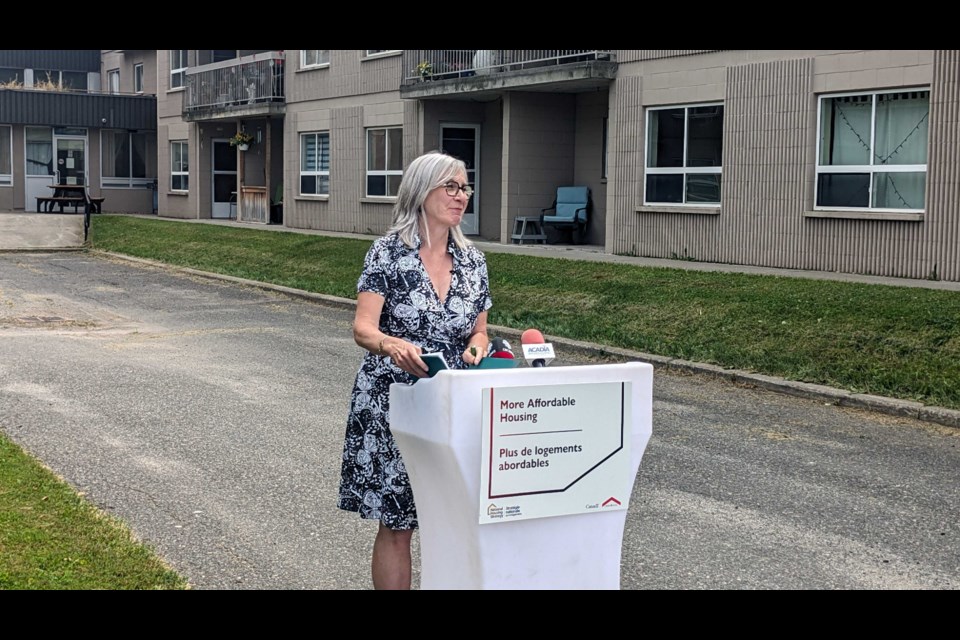THUNDER BAY – In a press conference at the Manion Court apartment complex, Patty Hajdu announced more than $84 million will be given to Northern Ontario communities to create a total of 231 new homes and repairs of 4,735 homes.
Hajdu, member of Parliament for Thunder Bay-Superior North, told Dougall Media in an interview that some of these projects are already underway, but with this boost in funding more communities across the region can access the Affordable Housing Fund (AHF) to complete the work.
“It's about saving affordable housing that's already in place," she said.
"Something that's actually one of the most cost-effective ways to make sure that we can ensure people have a safe place to live, but also building new units and so supporting builders like the DSSAB and other partners to be able to build quickly.
“And many First Nations across the region are also getting money to be able to restore or to add on to projects that they have underway. Many First Nations are extremely crunched for space and this is going to be a huge addition to their work to create strong, vibrant communities.”
The contribution will be through the federal government's AHF program, which supports non-profit, cooperative, and public housing providers that help people who need it most, including women and children fleeing family violence, seniors, Indigenous peoples, people living with disabilities, those with mental health or addiction issues, veterans, and young adults.
The announcement was made in front of Manion Court, located at 130 Donald St. W., which is operated by the District of Thunder Bay Social Services Administration Board. The building primarily serves as seniors' housing and has 102 units.
During the press conference, Hajdu pointed out the building needs repairs and AHF is a good way to get those renovations completed quickly.
For proven builders of multi-units, "they'll be able to get funding more quickly to get units off the ground more quickly. Often times people have a high degree of ambition but maybe don't have that level of experience doing multi-units,” explained Hajdu.
“But some places like the TBDSSAB would be well set up to be able to take advantage of that speedier access to funding because they're ready to go. They likely will have sites selected. They will have contracts and relationships with builders and they've been in the business. They understand how quickly they need to act to meet the need specifically now that this money is being put in place.”
Brian Hamilton, chair of the TBDSSAB, said a lot of current housing projects are about building new units. However, their piece of the funding will address an “immediate and pressing gap in capital spending” in buildings they currently own.
“You know people anecdotally talk about the infrastructure gap. Well, here it is and here is actually some recognition of that gap and it gives us some steps forward on how we can actually address that,” Hamilton said.
The TBDSSAB will receive over $2.9 million through the AHF to repair 2,109 units across Thunder Bay.
Marcus Powlowski, member of Parliament for Thunder Bay-Rainy River, acknowledged the shortage of infrastructure funding during the press conference when it was revealed earlier this year that TSDSSAB wasn't getting the money for affordable housing needed to fill in those gaps.
He said much of the struggle was due to an impasse between the federal and provincial governments. Fortunately, an agreement was made between the feds and the province in July to provide $357 million for affordable housing.
“There certainly has to be more housing and affordable housing. But increasingly your average person is finding housing not affordable," Powlowski said.
"For example, for students, recent graduates, and immigrants who came to Thunder Bay it used to be that you could get a room in an apartment shared with a bunch of people for $600 or $700, something fairly reasonable, but now it's up to like $1,000 or something.”
“Even people who are professionals like teachers who with their salary, given the higher price of housing, are finding it increasingly harder to be able to afford a home . . . if a good part of your income just goes to paying for your housing, it makes it that much more difficult to buy food and everything else you need in life.”
The federal government is supporting 4,966 affordable homes across Northern Ontario, many of which are in Indigenous communities including Kenora, Dryden, Fort Frances, and Wawa, as well as First Nations communities such as Wabaseemoong, Lac Seul, Bearskin Lake, Kitchenuhmaykoosib Aaki, Long Lake 58, and Webequie.
Sioux Lookout Student & Family Housing in partnership with Windigo First Nations Council will receive $3.3 million.
“Everyone deserves a place to call their own and the Affordable Housing Fund is one way we’re helping make that a reality for Canadians. We will keep investing in affordable housing projects like the ones announced today, and working with partners across the country, to end the housing crisis,” said Sean Fraser, Minister of Housing, Infrastructure and Communities, in a release.
